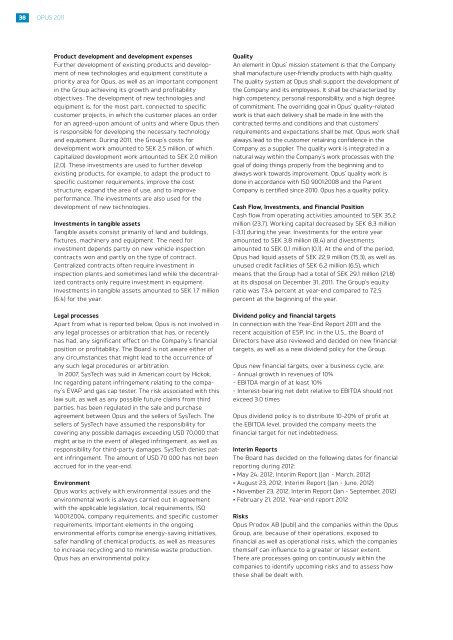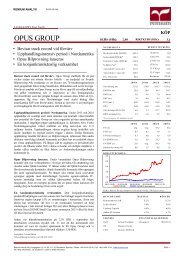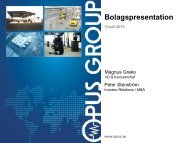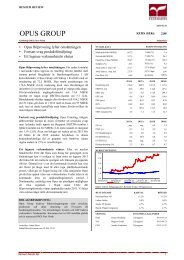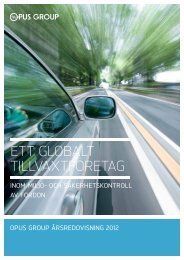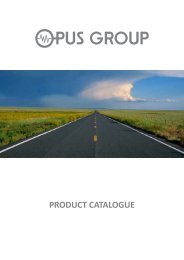Opus Group Annual 2011 Report ENG
Opus Group Annual 2011 Report ENG
Opus Group Annual 2011 Report ENG
You also want an ePaper? Increase the reach of your titles
YUMPU automatically turns print PDFs into web optimized ePapers that Google loves.
38<br />
OPUS <strong>2011</strong><br />
Product development and development expenses<br />
Further development of existing products and development<br />
of new technologies and equipment constitute a<br />
priority area for <strong>Opus</strong>, as well as an important component<br />
in the <strong>Group</strong> achieving its growth and profitability<br />
objectives. The development of new technologies and<br />
equipment is, for the most part, connected to specific<br />
customer projects, in which the customer places an order<br />
for an agreed-upon amount of units and where <strong>Opus</strong> then<br />
is responsible for developing the necessary technology<br />
and equipment. During <strong>2011</strong>, the <strong>Group</strong>’s costs for<br />
development work amounted to SEK 2,5 million, of which<br />
capitalized development work amounted to SEK 2,0 million<br />
(2,0). These investments are used to further develop<br />
existing products, for example, to adapt the product to<br />
specific customer requirements, improve the cost<br />
structure, expand the area of use, and to improve<br />
performance. The investments are also used for the<br />
development of new technologies.<br />
Investments in tangible assets<br />
Tangible assets consist primarily of land and buildings,<br />
fixtures, machinery and equipment. The need for<br />
investment depends partly on new vehicle inspection<br />
contracts won and partly on the type of contract.<br />
Centralized contracts often require investment in<br />
inspection plants and sometimes land while the decentralized<br />
contracts only require investment in equipment.<br />
Investments in tangible assets amounted to SEK 1.7 million<br />
(6.4) for the year.<br />
Legal processes<br />
Apart from what is reported below, <strong>Opus</strong> is not involved in<br />
any legal processes or arbitration that has, or recently<br />
has had, any significant effect on the Company’s financial<br />
position or profitability. The Board is not aware either of<br />
any circumstances that might lead to the occurrence of<br />
any such legal procedures or arbitration.<br />
In 2007, SysTech was suid in American court by Hickok,<br />
Inc regarding patent infringement relating to the company’s<br />
EVAP and gas cap tester. The risk associated with this<br />
law suit, as well as any possible future claims from third<br />
parties, has been regulated in the sale and purchase<br />
agreement between <strong>Opus</strong> and the sellers of SysTech. The<br />
sellers of SysTech have assumed the responsibility for<br />
covering any possible damages exceeding USD 70,000 that<br />
might arise in the event of alleged infringement, as well as<br />
responsibility for third-party damages. SysTech denies patent<br />
infringement. The amount of USD 70 000 has not been<br />
accrued for in the year-end.<br />
Environment<br />
<strong>Opus</strong> works actively with environmental issues and the<br />
environmental work is always carried out in agreement<br />
with the applicable legislation, local requirements, ISO<br />
14001:2004, company requirements, and specific customer<br />
requirements. Important elements in the ongoing<br />
environmental efforts comprise energy-saving initiatives,<br />
safer handling of chemical products, as well as measures<br />
to increase recycling and to minimise waste production.<br />
<strong>Opus</strong> has an environmental policy.<br />
Quality<br />
An element in <strong>Opus</strong>’ mission statement is that the Company<br />
shall manufacture user-friendly products with high quality.<br />
The quality system at <strong>Opus</strong> shall support the development of<br />
the Company and its employees. It shall be characterized by<br />
high competency, personal responsibility, and a high degree<br />
of commitment. The overriding goal in <strong>Opus</strong>’ quality-related<br />
work is that each delivery shall be made in line with the<br />
contracted terms and conditions and that customers’<br />
requirements and expectations shall be met. <strong>Opus</strong> work shall<br />
always lead to the customer retaining confidence in the<br />
Company as a supplier. The quality work is integrated in a<br />
natural way within the Company’s work processes with the<br />
goal of doing things properly from the beginning and to<br />
always work towards improvement. <strong>Opus</strong>’ quality work is<br />
done in accordance with ISO 9001:2008 and the Parent<br />
Company is certified since 2010. <strong>Opus</strong> has a quality policy.<br />
Cash Flow, Investments, and Financial Position<br />
Cash flow from operating activities amounted to SEK 35,2<br />
million (23,7). Working capital decreased by SEK 8,3 million<br />
(-3,1) during the year. Investments for the entire year<br />
amounted to SEK 3,8 million (8,4) and divestments<br />
amounted to SEK 0,1 million (0,1). At the end of the period,<br />
<strong>Opus</strong> had liquid assets of SEK 22,9 million (15,3), as well as<br />
unused credit facilities of SEK 6,2 million (6,5), which<br />
means that the <strong>Group</strong> had a total of SEK 29,1 million (21,8)<br />
at its disposal on December 31, <strong>2011</strong>. The <strong>Group</strong>’s equity<br />
ratio was 73,4 percent at year-end compared to 72,5<br />
percent at the beginning of the year.<br />
Dividend policy and financial targets<br />
In connection with the Year-End <strong>Report</strong> <strong>2011</strong> and the<br />
recent acquisition of ESP, Inc. in the U.S., the Board of<br />
Directors have also reviewed and decided on new financial<br />
targets, as well as a new dividend policy for the <strong>Group</strong>.<br />
<strong>Opus</strong> new financial targets, over a business cycle, are:<br />
- <strong>Annual</strong> growth in revenues of 10%<br />
- EBITDA margin of at least 10%<br />
- Interest-bearing net debt relative to EBITDA should not<br />
exceed 3.0 times<br />
<strong>Opus</strong> dividend policy is to distribute 10-20% of profit at<br />
the EBITDA level, provided the company meets the<br />
financial target for net indebtedness.<br />
Interim <strong>Report</strong>s<br />
The Board has decided on the following dates for financial<br />
reporting during 2012:<br />
• May 24, 2012, Interim <strong>Report</strong> (Jan - March, 2012)<br />
• August 23, 2012, Interim <strong>Report</strong> (Jan - June, 2012)<br />
• November 23, 2012, Interim <strong>Report</strong> (Jan - September, 2012)<br />
• February 21, 2012, Year-end report 2012<br />
Risks<br />
<strong>Opus</strong> Prodox AB (publ) and the companies within the <strong>Opus</strong><br />
<strong>Group</strong>, are, because of their operations, exposed to<br />
financial as well as operational risks, which the companies<br />
themself can influence to a greater or lesser extent.<br />
There are processes going on continuously within the<br />
companies to identify upcoming risks and to assess how<br />
these shall be dealt with.


